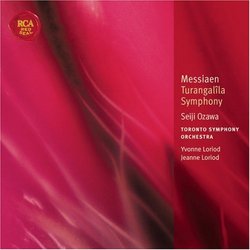| All Artists: Olivier Messiaen, Seiji Ozawa, Toronto Symphony Orchestra, Yvonne Loriod Title: Olivier Messiaen: Turangalīla Symphony Members Wishing: 0 Total Copies: 0 Label: RCA Release Date: 4/20/2004 Album Type: Original recording remastered Genre: Classical Styles: Forms & Genres, Concertos, Instruments, Keyboard, Symphonies Number of Discs: 1 SwapaCD Credits: 1 UPC: 828765941822 |
Search - Olivier Messiaen, Seiji Ozawa, Toronto Symphony Orchestra :: Olivier Messiaen: Turangalīla Symphony
 | Olivier Messiaen, Seiji Ozawa, Toronto Symphony Orchestra Olivier Messiaen: Turangalīla Symphony Genre: Classical
|
Larger Image |
CD Details |
CD ReviewsIt's About Time Daniel Cormier | Connecticut, USA | 05/14/2004 (5 out of 5 stars) "This has been the recording by which all Turangalila recordings have been judged since its original release more than 35 years ago. None have eclipsed it. Chung softens the edges, Previn hides the beauty. Nagano is good but the orchestra is dull while Wit would have had a great recording had the group been able to play in tune. Seiji beats them hands down. The performance is vigorous and intense and he is not afraid to show the ferocity or the beauty of the piece. The soloists perform well and the young Ozawa brings a youthful touch to recording that is at once refreshing and insightful. The TSO really play well as a group and are not timorous in any way. I have been nursing an LP of this for years and this release is very overdue. I have long wanted to play this in my car or on my iPod and thankfully, now I can." Historical importance, but not the best T. Herion | Philadelphia, PA | 02/14/2005 (3 out of 5 stars) "Many Messiaen fans have been waiting for RCA to release this historic recording on CD. Although the sound has been remastered, the interpretation and playing is still unsatisfactory. For some reason the orchestra is not able to handle the incredible technical demands placed on them by the score. There are a number of places where the instruments are not together, particularly during ritards (which are incredibly over- done to my taste). The tempos are also taken so slow as to zap much of the energy right out of what could be incredibly ecstatic music. I have a feeling that the tempos were determined more to fit the orchestra's capabilities than to fit the musical aesthetic. Just to be clear, I consider the Turangalila to be a masterpiece in its own right, and the Seiji Ozawa recording is important in that it is the first, but there have been much better recordings since. I highly recommend the Concertgebow recording." It may not sound like a love song, but it really is Eric S. Kim | Southern California | 03/04/2009 (5 out of 5 stars) "The Turangalila Symphony by Olivier Messiaen is not for everybody. Indeed, this is for those who have learned to love works by Schoenberg, Ligeti, Stravinsky, Janacek, etc. But for those who love the earler melodic music of Tchaikovsky and Beethoven, don't be afraid to try some of the more modern music. It may sound very uncomfortable, but it might grow on you after repeated listenings. With that in mind, the Turangalila Symphony one of the masterpieces of 20th century classical music. It is a 75+ minute composition that centers on three major themes: statue, flower, and love. But these themes don't have the melodic feeling that Wagner or Rachmaninov bring out in their own works. These are more in the likes of Schoenberg's serialism and Stravinsky's "Rite of Spring" brutality. This is a very colorful, chaotic, and etheral experience that actually inspires.
It's sometimes hard to believe that this recording with Seiji Ozawa was made back in 1967, mostly because the audio quality on this RCA disc is superb in every way. It sounds like it was made only a few years ago. Ozawa knows how to grab everyone's attention. The majestic energy and terrifying ethereality can be best described as explosive. Nothing is exaggerated, however, and the conductor still makes light of the soft spots. The Toronto Symphony gives out a great performance. The heavy percussion have it loud and clear, the brass and woodwinds never sound muffled or weak, and the strings sure know how to get it right. I've already taken a liking to 20th Century classical music ever since I first listened to Stravinsky's "Rite of Spring" a long time ago, and I'm still open to all of the different varieties of classical music (except Baroque, I'm not a big fan of that one). Messiaen's "Turangalila" has quickly become one of my favorite 20th century pieces of all time, alongside "Rite of Spring" and Debussy's "La Mer" and many others. I just hope my disc doesn't wear out when I play it constantly." |

 Track Listings (10) - Disc #1
Track Listings (10) - Disc #1